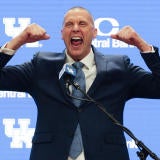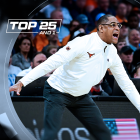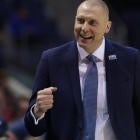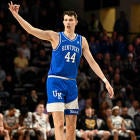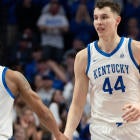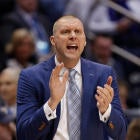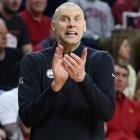
NEW YORK -- The most memorable image of the 2014 NBA Draft went to the player who wasn't chosen by any team, but instead was selected by the entire league.
Baylor's Isaiah Austin was the best pick of the night and subject to one of the most memorable, sentimental draft events ever. Commissioner Adam Silver ushered an emotional, earned moment Thursday at the Barclays Center in Brooklyn when, between the 15th and 16th picks, Silver did something Austin, his high school coach and his family -- all there sitting with him in the green room -- had no idea was coming.
"The NBA selects: Isaiah Austin," Silver said.
Thousands were already on their feet, giving Austin an ovation. The slender 7-footer donned a royal-blue NBA lid, dipped his head into his massive right palm for a few seconds, then made his startled way up to the stage. He was crying, and Silver almost was, too. Andrew Wiggins' mother walked right to Isaiah's and embraced her in a huge hug. Austin deserved that moment; it was an accomplishment, a climactic achievement that only six days ago he was hoping to experience.
But Austin didn't have a remote clue it would or could be like this.
Whereas all other greetings between player and commissioner Thursday night inaugurated NBA careers, Austin's handshake with Silver signaled the end of his basketball-playing life. He has been diagnosed with Marfan Syndrome, a connective-tissue disorder that went unrecognized all Austin's life and very well could have killed him. Some of his cells aren't fully developed. He has stretch marks across his body because of it. Austin's aorta has been growing wider in the past two years. If it continues to expand, open-heart surgery will be mandatory. The disease has no cure, but the immediate cessation of aggressive athletic activity gives Austin a better chance at living a long life. This devastating development wasn't even known a week before the draft.
Baylor coach Scott Drew was reached late Thursday night somewhere off the coast of Florida, heading on a cruise ship toward the Bahamas. He had booked the vacation long ago, and wished he could've been there for Austin in wake of the news. Drew said he welled up watching the proceedings unfold thousands of miles away, he sitting in his room with his family and seeing Austin overcome with emotion.
"The way they did it was just total class," Drew said. "Anyone watching, if you didn’t have a tear in your eye, man, I don’t even know. Give the credit to Adam Silver and Greg Shaheen."
It was Shaheen, the longtime head of the NCAA Tournament, who quietly helped orchestrate the tribute in the past 72 hours. Silver personally called Austin earlier in the week to invite him and ensure he experienced the once-in-a-lifetime opportunity.
"We knew we wanted to do something that would allow his dream to come true. He's a special young man," Silver told CBSSports.com. "And it was very difficult for me to maintain my composure up there. It's sad that something that was such a big part of his life has been taken away, but he's making the best of a bad situation. That's the best kind of outlook on life. We're proud of Isaiah."
While the abrupt news of Austin's diagnosis came as a shock, his health hurdles had become known in recent months. Austin was subject to one of the more surprising revelations of the college basketball season when he revealed he had been playing blind in one eye for some time due to a detached retina. Despite the hindrance, Austin remained a projected first-round pick. And a week ago today, the same day a worried doctor called a weeping mother, was the same day one team told Austin it was vowing to take him if he was available in the first round.
Cruel irony, but don't tell that to Austin.
"To be blessed to play this game as long as I did, I’m just really thankful," Austin said. "God has truly blessed me, because he could have let me continue to play basketball, but instead he saved my life.”
The disease is not glaringly uncommon; 1 in 5,000 people are diagnosed with Marfan Syndrome, yet still so few people know of the malady. And so Isaiah Austin will now become the willing face of the affliction.
He has had almost no time to himself since going public with this on Sunday. Interviews and appointments and travel have consumed his life. The night before the draft, while all other players were huddled with friends and family, fighting butterflies and staring up at the night sky blocked out by Manhattan's skyscrapers, Austin was meeting with the president of the Marfan Foundation to discuss his role going forward.
He's educating himself on this disease, and he's set on educating the world, too. Less than a week in, the message is being sent and awareness has skyrocketed.
"Since he announced, the [Marfan] website has been bombarded," Lisa Green, Austin's mother, said. "They've needed someone to be an advocate. And he's it."
The call from the doctor to Green came just after the work day was over. She was making the drive home. It was horrendous news, hard to process at first, and upon walking into the house she immediately told Austin's stepfather, Ben. The two of them and their two children, 15-year-old Noah and 11-year-old Narah, live in Kansas City, Missouri.
When Green knew her oldest son's dream would have to end, Austin was 630 miles away -- playing basketball and unknowingly risking his life. Baylor was holding an annual camp for schoolkids, nearly 400 of them, plenty probably hoping they could one day be the next Isaiah Austin. Word of Austin's condition spread from his parents to his agent to his high school coach and the Baylor coaches. Austin was refereeing games and playing with kids in drills. He had no idea his life had changed forever. He would live like this for only 22 more hours.
The decision was made by mom: let him play the game he loves just a little while longer before telling him the awful news. Austin wasn't exerting much energy at the camp as it was.
Drew said he was "numb to the news" when he found out. Paul Mills, a Baylor assistant who was working the camp, found out around 8 p.m. He too was gobsmacked.
"We wondered if we should pull him off the court. It’s over," Mills recalled thinking. "He’s never playing basketball again. I remember Isaiah as a seventh-grader, visiting campus, 6-7 tall. He’s the only junior high kid I've ever gone to see. You’re thinking back to all those instances over the past eight or nine years, and you're about to deliver news that will floor this kid."
While this was happening, Green was assembling an intervention that would have to take place the next day at a close friend's house ... all the way outside of Dallas, in Grand Prairie. They packed up the car and were out of Kansas City by 8:30 p.m., driving nine hours south to see their son. Green cried most of the way. They got in around 4 a.m.
"I had to drive, just to keep myself together -- for her," Ben Green said.
Requests were sent out to the entire Baylor coaching staff, close friends and pastors in the area. Be there for Isaiah in the worst moment of his life. All obliged.
All the while, Ray Forsett, Austin's high school coach, was playing none the wiser. Austin had a workout planned for Saturday morning, and although he wasn't thrilled about it, he told Forsett he absolutely would participate in it. Perhaps the promise from that NBA team played a part. He wasn't going to skip anything. Forsett knew Saturday morning would be Austin's last true effort on a basketball court.
"I can't get that out of my head," Forsett said. "I keep thinking about how he was so determined to get that workout in. It was the toughest day of my life. I've never lied to him."
It was Friday evening when Forsett took the call, then sat in his car for more than an hour, crying himself empty. After the workout the next morning, Austin and Forsett drove over to NBA player Mo Williams' house for a cookout and some games on PlayStation 3. In the moment, Forsett could laugh and play it cool. But eventually they both had to get in his car and drive to Grand Prairie. He was dreading it. He tried to keep the 25-minute trip light-hearted, but as the car got closer to Austin's family and close friends, his face gave the tell.
"Why's Pop's car here? What's going on?" Austin asked Forsett as they pulled up to the crowded driveway.
Forsett could no longer look at Austin. He was on the verge of losing it.
Austin walked into the house, nearly 20 familiar faces waiting, all fighting a droop. His eyes locked on his mother's, who were already welled to tears. His stepfather was holding her, and the reality of why this family reunion was happening slammed him.
"No," Austin immediately said. "Please don't tell me what I think you're going to tell me."
"I'm sorry, Isaiah," were the first words Lisa could get out.
Before she said them, he knew. Doctors told him about the possibility of Marfan in Chicago, at the draft combine. There was no other reason for him to see his family in that house right then and there. They weren't supposed to be in Grand Prairie, not today. It was Saturday, and Noah had a track meet to prepare for. Austin turned his back and began to cry. Everyone did. It was emotional at first, but in talking to six people Thursday night who were in that living room last Saturday, without prompt, they all recalled how Austin composed himself, sat on the steps that led up to the second floor, and encouraged his younger siblings not to be afraid.
“You’re thinking, This kid has already switched gears,” Mills said.
This wasn't going to keep him down. This wasn't going to stop him. A dream was over, but a new life was realized. They all stayed for a few hours, well past midnight, and discussed what would come next. Austin admits he couldn't sleep; the news hit him hard as he laid alone, stared at a black ceiling, and was forced to accept playing basketball ever again was not an option if he wanted to live.
The gesture was heartwarming; the experience trumped it. Austin was indeed drafted Thursday, and he took the car wash to prove it. A post-handshake TV interview with ESPN. Then right to the radio interview. Then flanked by cameramen as he marched toward the press conference area. More television and radio interviews followed.
"For commissioner Adam Silver to even invite me here was a tremendous blessing,” Austin said. "It shows how much class that man has. I have so much respect for the NBA. I have so much to be thankful for. I’ve had a tremendous amount of support from everyone around the world. Every single person that has reached out, I really give my gratitude to them. It was one of the greatest moments of my life, one I’ll never forget. I love this game of basketball so much. It’s really changed my life."
Austin's week has been something hard to interpret or empathize with. He said his emotions have gone from the saddest he has ever been to the happiest. It wasn't just Silver calling his name and thousands of strangers applauding his appearance. Austin said watching his fellow invitees have their names called was "one of the biggest blessings" of his life.
"These past couple of days have really taught me a lot about myself," he said. "They’ve really shown me, no matter what obstacle you get thrown in life, there’s always a way around it or a way through it. … For the rest of my life I’m going to keep a positive attitude and not take anything for granted because it can be ripped away from you in seconds.”
Basketball was, but his life wasn't. In medical terms, it very easily could have been.
"The doctor was frank with us -- he told us Isaiah was lucky to be alive," Green said.
Mills remembers a day in practice last year when the team ran 40 suicides. A suicide involves running up and down the floor in different intervals; Mills said they take about a minute per. Forty minutes of grueling activity, and Austin's body took it. It did not fail him.
"We’re fortunate we didn’t have a situation like Hank Gathers," Mills said. “It’s a miracle."
Forsett was prone to run his high school players ragged, too.
But Austin is here, lucky to be alive and now thriving on what's next.
So what is next?
"Everything," he said at his press conference, which ended in a rare display from the media: a round of applause, almost every person in the room thanking and giving appreciation to Austin.
He'll finish out school at Baylor in the next two years, most likely, and from there he has a standing invitation to be hired at the NBA level. Silver said as much Thursday night. Really, this diagnosis has changed Austin's life drastically in myriad ways. ESPN has already reached out and offered him a chance to work as an analyst. The NBA is eager to see when he can start working with NBA Cares, as he is already seen as an ideal spokesman. He could well work on becoming a coach and being on Baylor's sidelines the next two years, NCAA permitting.
And there's still a lot of advocacy work to do. The family recorded an interview for Good Morning America on Thursday that will run Friday morning. Late Thursday night, the family agreed to do a CNN interview at 7:45 a.m. on Friday -- in advance of an 11 a.m. flight back home.
"I still want to take things slow," Austin said. "I'm only 20 years old."
"You know, he's still in the mourning process," his mom said from outside suite A10. Isaiah was inside that suite, sitting up top, watching the second round of the draft play out, staring off at the stage that was his, and still is. We won't soon forget what Silver and the NBA did for him.
With that, so ended what was the toughest week of Isaiah's life, a week that also became the most uplfiting and sparked a journey that has altered the way he sees the world and the way the world sees him.











